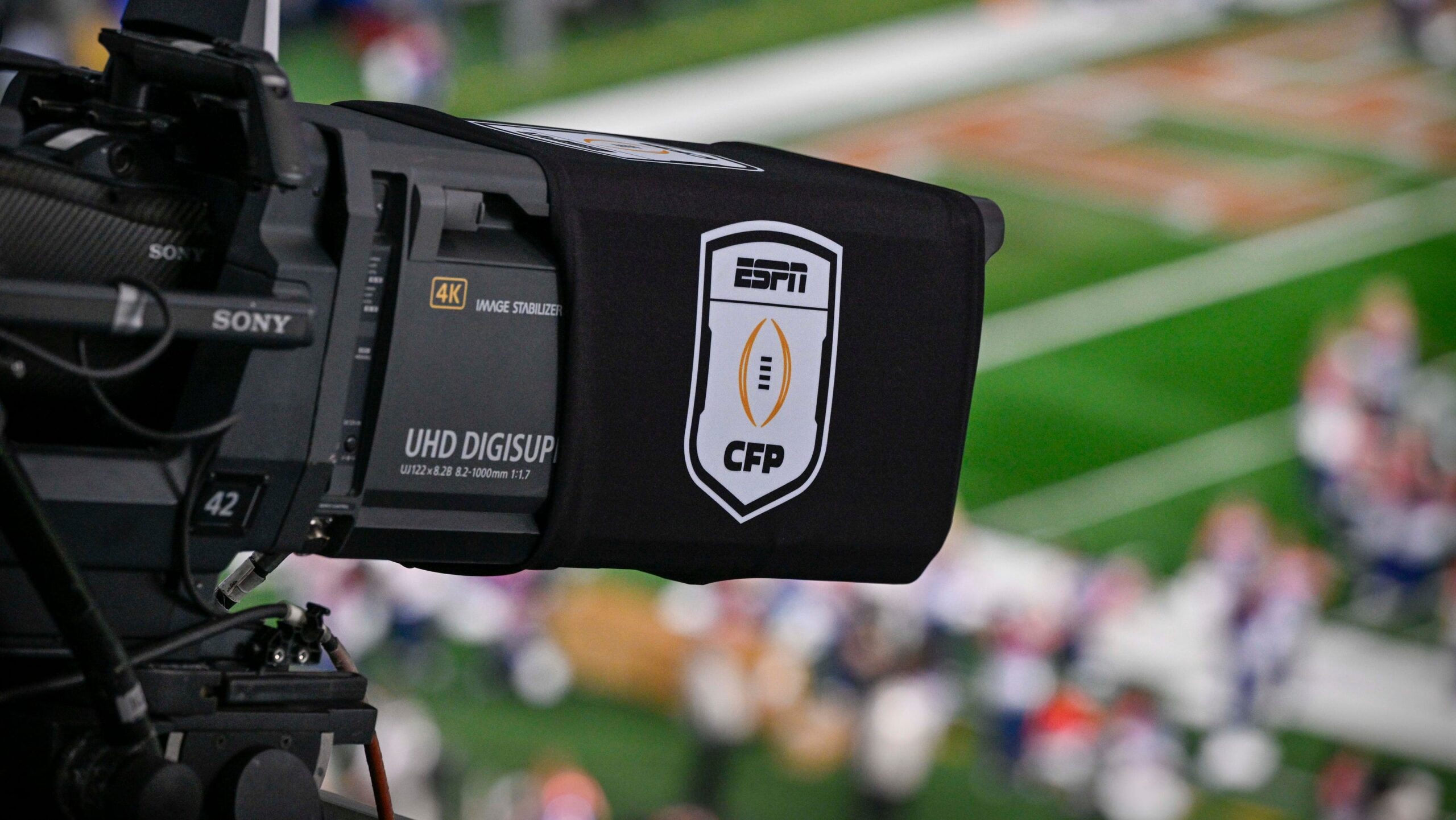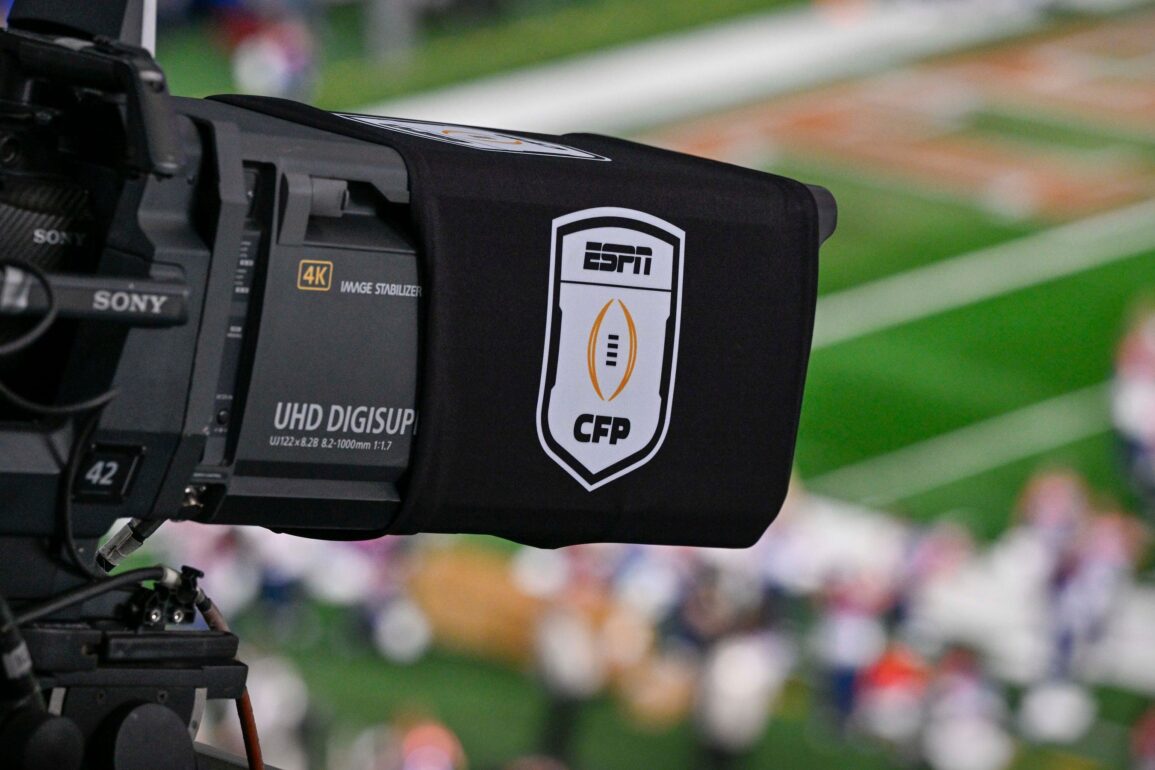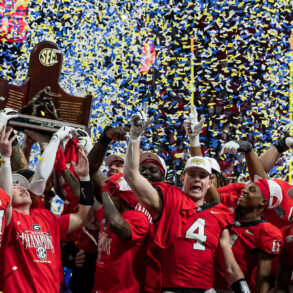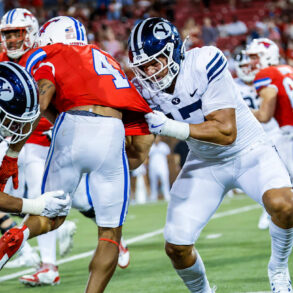
The waves of change are crashing down on college football, pounding this sport relentlessly. Coaches are cancelling spring games because of fears about the transfer portal and worries about overloading players with football over the course of a full year. NCAA legislation isn’t changing spring football. Coaches are organically reshaping the issue. Now we have another organic news story — technically and narrowly outside the range of college football — which is likely to reshape the sport. ESPN and Major League Baseball are divorcing. It seems hard to believe, but ESPN was not able to arrive at an agreement with MLB, meaning that next year, Disney won’t be showing Sunday Night Baseball. You can do the math on this.
ESPN hasn’t made any sort of announcement and there isn’t any official news to report, but if you put two and two together, just exactly what is likely to happen here? Let’s be real: College football is probably going to establish a regular Sunday presence starting in 2026. Let’s walk through the ins and outs of another seismic change likely to come to college football before too long:
Pickleball can’t fill all the gaps for ESPN
With no Major League Baseball on Sunday nights in August and September, ESPN can’t fill all those hours with pickleball or cornhole. The NBA isn’t on. Neither is the NHL. Major League Soccer could fill some slots, but prime time? Soccer fills just a two-hour window. WNBA games fill two and a half hours. Those will be pieces of ESPN Sunday sports programming, but not the full pie. There isn’t enough non-football inventory to give ESPN a complete baseball alternative. College football is the best answer.
Big Ten, SEC will sit this one out
College football should come to ESPN on Sundays, but it won’t be in the Big Ten — ESPN doesn’t cover that conference anymore — or the SEC.
ESPN will naturally feature its SEC games on Saturdays as the crown jewel of the schedule. The SEC is king of the hill in terms of brand-name recognition. It makes no sense to slide SEC games over to Sundays. The whole point of ESPN and Disney having the SEC was to be able to put SEC games on for a full Saturday: Alabama at noon Eastern, Georgia at 3:30, Texas at 7:30. The SEC won’t be part of an ESPN Sunday plan unless it’s an SEC Network game between Vanderbilt and Mississippi State.
Second-tier games
ESPN Sunday college football would not involve games expected to be blockbusters. The featured items go on Saturdays. Sunday would be reserved for second- or mid-tier games in conferences. This will make even more sense as we go along.
Competing against the NFL
You knew this would be discussed before too long, and it’s the obvious reason some will be skeptical about college football migrating to Sundays: the big, bad NFL, the TV ratings ruler in the sports landscape. Of course ESPN will not go up against the 1 p.m. NFL window of games. Of course ESPN will not start any game at or near the 1 p.m. or 4:25 p.m. time slots. We aren’t going to see large quantities of college football games on NFL Sundays. This will be a constant but carefully-chosen and limited set of games.
Time slots
Here’s what would make sense for ESPN: an early-morning Sunday game with a 10:30 or 11 a.m. start time in the East, then a late-afternoon, early-evening game at 6 or 6:30 Eastern which would not go directly against an NFL late game on NBC Sunday Night Football. ESPN would get nearly one full hour — 7:25 or 7:30 to 8:20 Eastern — in which no other football games are going on. A 6 Eastern game would end near 9:30 Eastern, just one hour into NBC’s SNF game. There are plenty of fans who would watch the end of the college football game and then pivot to the NFL game just before halftime, able to watch the full second half.
Reminder about NFL Sundays
The NFL has still not maximized its potential ratings on Sundays, as shocking as that statement might seem to some. It’s true: The NFL puts on seven or eight games in the 1 p.m. Eastern window on most Sundays, then three to four games in most of the late-window (4:05 or 4:25) slots. There are several Sundays each NFL season in which the late window consists of dumpy, second-rate games such as Browns at Raiders or Jaguars at Broncos. There might be only one really attractive matchup on paper, and if that attractive (TV) matchup becomes a blowout, the late NFL window becomes very dead and uninteresting. This is why ESPN should have no fear or regret about putting a mid-level game at 6 or 6:30, perhaps as early as 5:30 (but no earlier than that). There’s a definite space to take advantage of here. When the NFL late window dies — as it does several times each season — fans would love a college football alternative to flip to.
ACC, Big 12, Mountain West, MAC, Sun Belt, C-USA
The ACC could use ACC Network as the vehicle for an early 11 a.m. Sunday game — not between title contenders, but between Wake Forest and Virginia. More eyeballs will go to that kind of game on Sunday mornings than on Saturdays with all the other games going on.
MAC — the conference of MACTION — can also work out a deal with ESPN for Sunday morning football. It would make obvious sense. The other small conferences could become part of a rotation on Sunday mornings.
The 6 p.m. (maybe 5:30, maybe 6:30) early-evening game would be a natural fit for the Western schools in the Big 12. Utah at Arizona or Houston at Arizona State would be natural fits for a Sunday evening game. The Mountain West could also enter this space, given its presence in the Pacific and Mountain time zones.
ACC and smaller Group of Five conferences in the late morning, Big 12 and Mountain West in the evening. ESPN would have at least two games every Sunday, possibly three or four.
Free idea, ESPN
Hawaii football home games at 11:30 p.m. Eastern time on Sunday nights. It makes all the sense in the world.
August college football
ESPN’s lack of Major League Baseball programming on Sunday nights leaves its August lineup particularly barren. The WNBA would be a natural fit, but with no NFL games on in August, it makes even more sense for ESPN to load up on college football at this point on the calendar. Expect the season to move up one or two weeks, with several Sunday games on ESPN in late August before downshifting to just two or three games against the NFL in September, in the time windows we outlined above. One can imagine the two Sundays before Labor Day weekend being stuffed with college football games.
The new reality of college football
With the 12-team College Football Playoff comes the reality that teams might have to play 16 or 17 games to win the national championship. This means teams need more off weeks during the season. This means stretching out the season into mid-August makes more sense, not less. A season starting in mid-August would guarantee more rest breaks for teams during the regular season. This can serve ESPN’s interests by facilitating more mid-August football. Sundays would naturally be part of this expansion plan.
ESPN can and should do more
Sundays aren’t the last frontier in college football television. ESPN has improbably and weirdly not occupied the Wednesday night before Thanksgiving Day. There should be a high-profile game on that specific day, but there isn’t. ESPN can also use the expansion of the season into mid-August to have a night game every day of the week in late August. Day games would obviously be too hot for the athletes, but a night game would be comfortable in most locations (not Arizona State, but other places for sure). There are more ideas for ESPN to explore in college football. This isn’t going to end with Sundays alone.
This post was originally published on this site be sure to check out more of their content.








